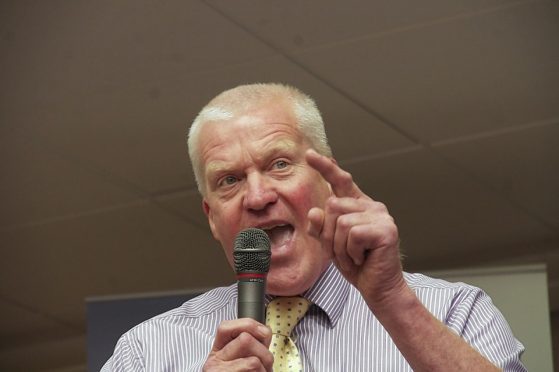The powerful protest group, Farmers For Action (FFA) is to lead members and supporters on an industry march to Downing Street later this month.
FFA chairman David Handley yesterday called on Scottish producers to join the March 23 march which will culminate in an appeal to Government to back British agriculture.
“We’re not going there asking for money,” Mr Handley said.
“What we want is for Government to decide if they want farming to exist in the UK or if they just want food from anywhere in the world.
“We’re importing vast quantities of produce into this country which could easily be grown by UK farmers.”
Mr Handley, a dairy farmer, was speaking after First Milk, the Glasgow-based farmers’ cooperative, cut their price to producers who supply milk to be made into cheese.
A First Milk spokesman said continued weak market conditions and plentiful supply of milk meant a fall of 0.42p per litre for Scottish producers.
Mr Handley said he had feared a deeper cut because the cheese market was now at “saturation point”.
“But any price cut has a massive impact on a farming business and First Milk producers are some of the lowest paid in the country,” he added.
Mr Handley went on to predict further price falls in April and May when the “spring flush” of milk comes on stream.
“I fear the April cut could be very savage indeed, bearing in mind what’s happening in the UK and globally,” he said. “There’s too much milk being produced but farmers are so desperate for money they just keep on producing.”
He said that dairy farmers needed to “waken up” to the reality and consider an exit strategy from the industry.
Mr Handley admitted that he had weighed up the pros and cons of staying in the industry himself and had sold all his young stock so that his business was carrying no extra weight.
“I’m now milking a low number of cows but if there’s a big cut in April, like I’m expecting, there’s no way we can continue. I’m not covering costs now so if the price drops by another 1-2ppl I can’t continue milking.”
Outspoken Dumfriesshire dairy farmer, Gary Mitchell also said the industry had reached a point of no return.
“The problem is that cow prices are dropping so if we put animals off the price would be very poor,” he said.
Mr Mitchell added that the huge increase in farmers switching to spring rather than year-round calving herds had exacerbated the problem.
“It’s making seasonality even more severe,” he said. “Supply is getting too far out of kilter and processors have been too slow in catching up with it.”
